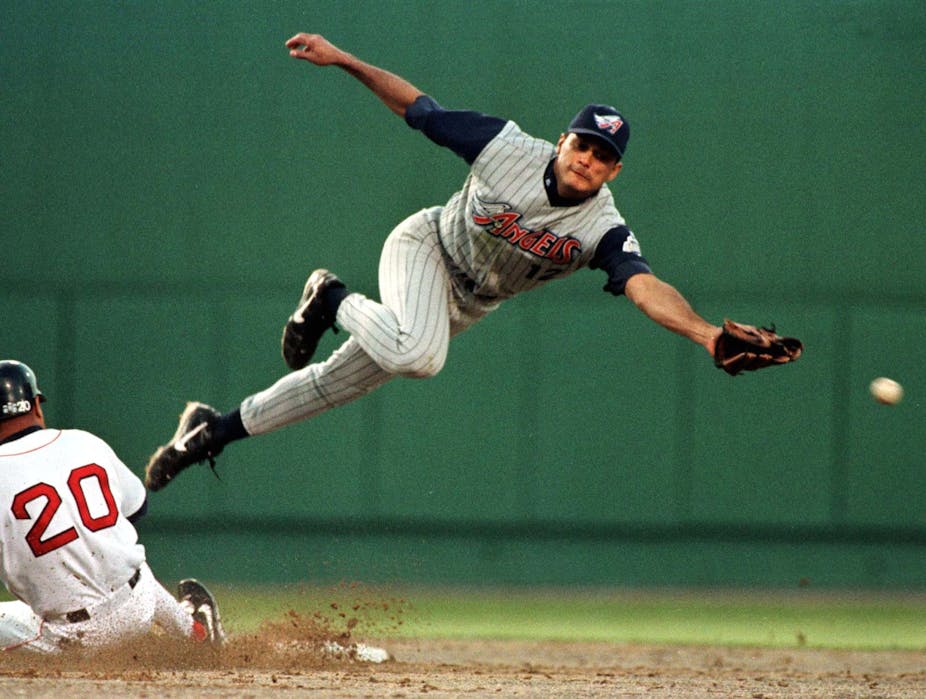Der mentsh trakht un got lakht.
This Yiddish proverb is usually translated as “Man plans and God laughs.” And if plans include predictions then the saying aptly applies to the upcoming Major League Baseball season.
As happens every spring, dozens of media experts and publications have offered their predictions for the 2015 Major League Baseball season. For example, The Sporting News has the Cubs winning the World Series, while Sports Illustrated sees them as a third place team.
How correct are these prognosticators of high repute? Historically, does one source consistently emerge above these rest?
A colleague and I decided to find out.
From weather to…wins?
The ability to predict successfully (at least some of the time) is a key aspect of mankind’s evolution and development. Observations of cause and effect are one of the earliest ways in which humans learned to predict outcomes such as changes in the seasons. Throughout history, the supernatural, mythological and the divine have all served as major sources of prediction.
More recently, psychological constructs such as prospect theory (which considers how people make decisions based on potential losses and gains) and cognitive bias have become important advances in understanding why some people predict outcomes as they do.
Not surprisingly, the mainstream sports media spends little, if any, time considering the historical or psychological roots of prediction. Instead, predictions of season outcomes seem to emerge from two distinct groups:
1) Media “experts”
This group includes most sportswriters or sportscasters although increasingly professional statistical analysts, such as the team at Baseball Prospectus, will weigh in.
These forecasters seek to demonstrate their professional worth. After all, a professional baseball writer or broadcaster should have access to “inside information” not available to the average fan – and this knowledge should lead to better predictions. Of course, there’s rarely any follow-up to the predictions once they’ve made and disseminated and no one is held accountable for being a good, mediocre or poor prognosticator.
Last year, for example, among ESPN’s panel of baseball experts, fifteen chose the Tampa Bay Rays to win the American League pennant – with six analysts picking the Rays to win the World Series.
Tampa Bay finished fourth in the AL East, 19 games out of first place.
2) Commercial products
Predictions are also part of annual content designed to attract attention to a particular publication, website, program or podcast prior to a season.

In its predictions, a media outlet will often hype popular teams. For example, The Sporting News’ Baseball Yearbook is predicting that the Cubs and Red Sox will meet in this year’s World Series, even though both teams finished last in their divisions in 2014.
But there’s a reason for heightened focus (and promotion) of these two clubs: their vast, nationwide fan bases will be pleased that some experts foresee great things for their teams in 2015, which may make them more inclined to impulsively read or purchase these publications.
And the winner is…
So who does the best job of predicting MLB standings? Or is any layperson able to use the common psychological adage “the best predictor of future behavior is past behavior” (a favorite of Dr Phil’s) to reliably forecast the final standings?
In order to begin to answer these questions, we conducted a relatively simple correlational study of the recent results of MLB predictions.
For the years 2009-2014, we compared media predictions of outcomes with the final standings for each of baseball’s six divisions. Correlations were run for nine media sources: five print publications (Sports Illustrated, The Sporting News, ESPN the Magazine, Athlon Sports and The New York Times) and four online sources (Baseball Prospectus, ESPN.com, Yahoo.com and Bleacher Report).
We also correlated each source’s predictions with the previous year’s standings to see just how much the prognosticators relied on past performance to predict future performance.
Finally, we correlated the previous year’s standings with the current year’s final standings. This way, we could see how well one could predict by relying only on how the teams finished the previous season – in other words, without access to “expert” knowledge.
In the correlations below, keep in mind that a score of 1.0 would mean a “perfect” correlation – in other words, the predictions and final standings would be exactly the same.
The average correlation between predictions and final standings for all nine sources for all six years was .49. Some individual publications were better forecasters than others, although the differences were modest.
The breakdown was as follows: Sports Illustrated (.51), The Sporting News (.53), ESPN the Magazine (.47), Athlon Sports (.50), The New York Times (.51), Baseball Prospectus (.45), ESPN.com (.49), Yahoo.com (.48) and Bleacher Report (.46).
As a group, the print sources beat the online only sources .50 to .47. Interestingly, the overall winner, The Sporting News, has the strongest historical relationship to baseball. (For many decades it was known as the “Bible of Baseball.”) And who knows, maybe TSN will be right about the Cubs winning the World Series in 2015.
Collectively, the sources seemed to rely heavily on the immediate past. The correlation between the current year’s predictions and the previous year’s final standings for all years and all sources was .65. Baseball prognosticators do seem to believe that “the best predictor of future behavior is past behavior.”
So does baseball expertise contribute to the accuracy of predictions? Can the experts beat an amateur who would rely exclusively upon the previous year’s results for their predictions?
In a word: no.
The correlations between the previous year’s final standings and the current year’s final standing for the six years was .49 – exactly the same as the experts’ predictions.
So if you simply took last year’s standings and used them to predict the upcoming year’s standings, you would be doing as well as our nine sources did over the last six years.
And the baseball gods laughed.
Note: no predictions were found for ESPN.com for 2010. Our results for ESPN.com are based on five years (2009, 2011-2014)

